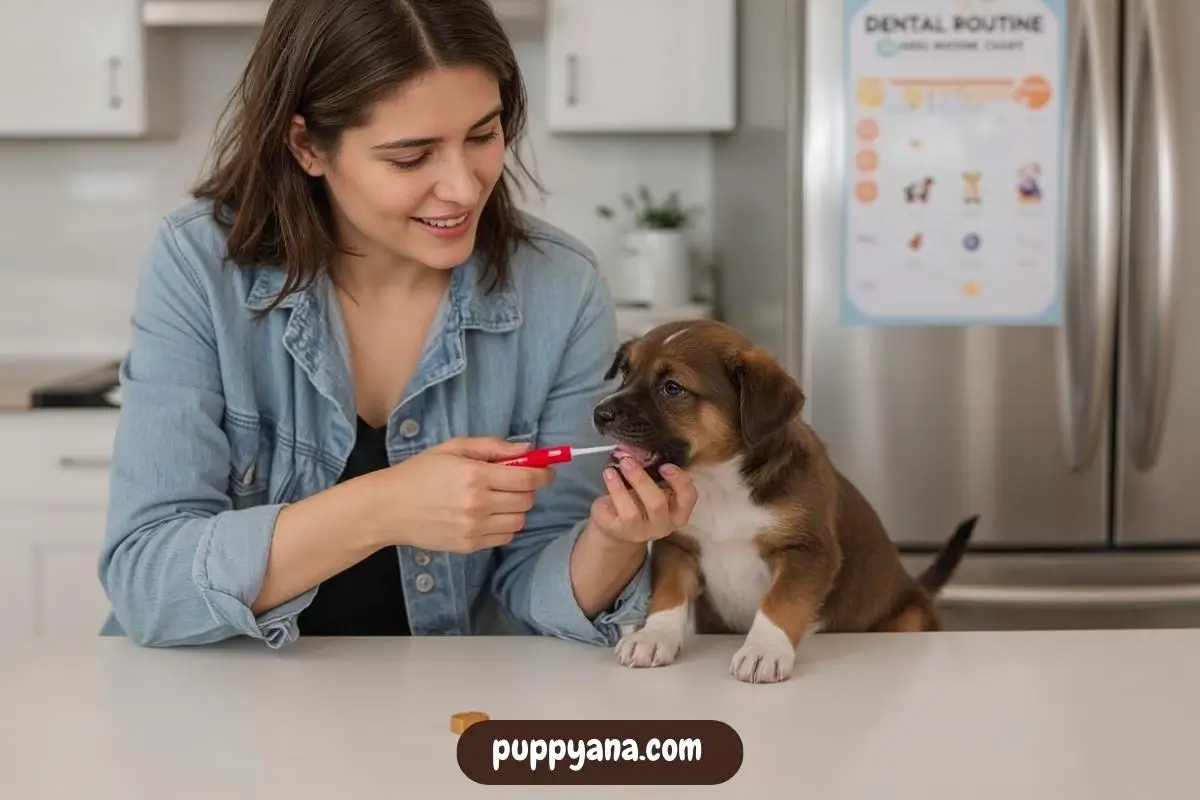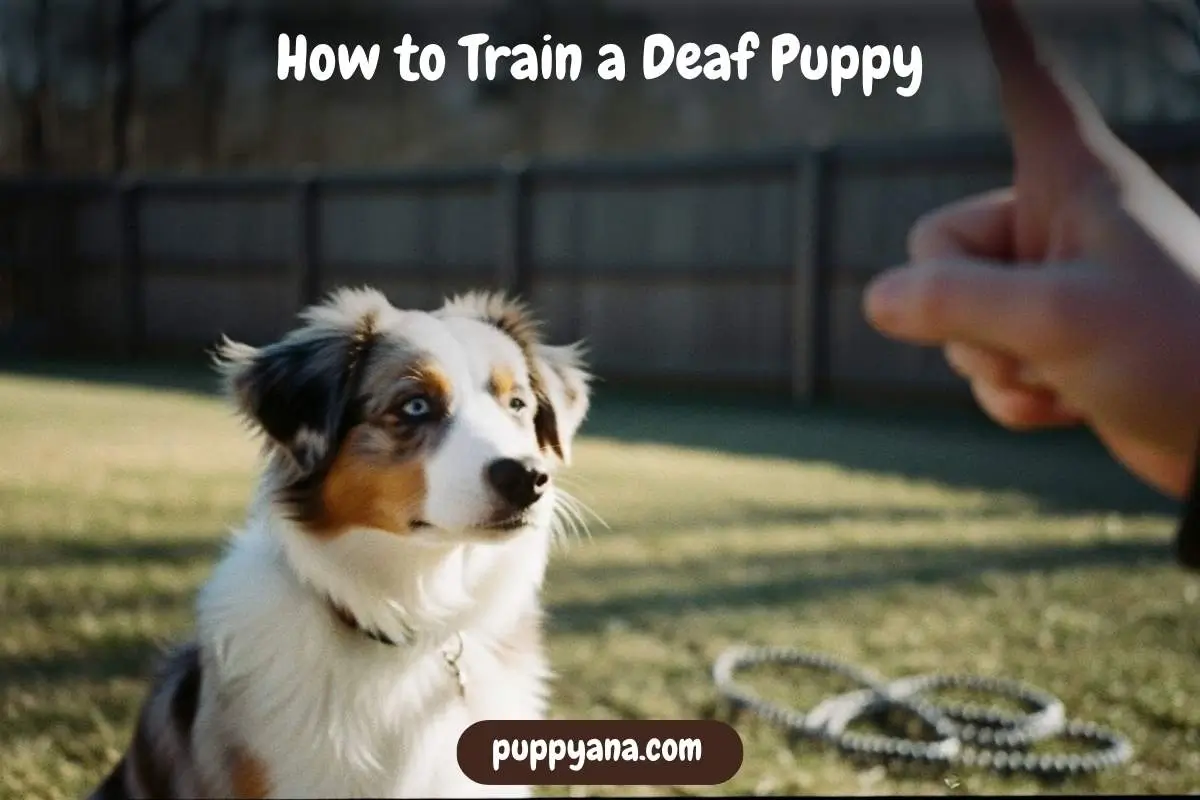It starts with more chewing than usual, and then you find a tiny tooth on the floor. Teething is officially here.
If you’ve brought home a young pup, one of the first milestone questions you’ll ask is: when do puppy teeth fall out?
The answer depends on age, breed, and even diet, but all pups go through this process.
In this guide, you’ll learn exactly:
- When puppy teeth erupt and fall out
- What’s normal vs. what’s concerning
- How to soothe your puppy
- What to expect as adult teeth grow in
So, let’s dig in gently, of course.

Table of Contents
ToggleWhen Do Puppy Teeth Fall Out?
Puppies start losing their baby teeth at about 12 to 16 weeks old, and the process typically finishes by 6 to 8 months of age.
According to the AKC, puppies are born toothless. Their 28 baby teeth emerge by the time they’re 8 weeks old, and then slowly begin falling out as adult teeth push in.
General Timeline:
- 3–6 weeks: Baby teeth erupt
- 6–8 weeks: Full set of baby teeth
- 12–16 weeks: Baby teeth begin falling out
- 16–24 weeks: Adult teeth erupt
- 6–8 months: Teething ends with a full adult set (42 teeth)
So when do puppy teeth fall out? Usually in the first half of their first year.
Signs Your Puppy Is Losing Teeth
You might not even see the teeth falling out, they’re often swallowed or lost while chewing.
But here are the common signs:
Puppy Teething Clues:
- Blood on chew toys or bedding
- Gums appear inflamed or red
- Whining or crankiness during chewing
- Excessive drooling
- A sudden drop in appetite
- Finding tiny teeth around the house
Occasional light bleeding is normal. If it continues or looks excessive, check with your vet just to be safe.
Why Puppies Lose Their Baby Teeth
Just like babies, dogs are born with a set of deciduous (baby) teeth that are smaller and sharper, perfect for learning how to eat, chew, and play.
Once their bone structure matures, permanent adult teeth push the baby teeth out naturally.
Most pups will lose front teeth first (incisors), followed by:
- Canines
- Premolars
- Molars (these only appear as adult teeth)
Occasionally, some baby teeth don’t fall out, this is called retained baby teeth, and it can lead to dental crowding.
Check retained baby teeth in dogs to understand if extraction is needed later on.

How to Help Your Puppy Through Teething
This period can be uncomfortable or downright painful for puppies.
Here’s how to help ease discomfort while reinforcing good habits.
Ways to Help:
- Frozen chew toys or carrots
- Soft rubber tuggers or textured teethers
- Rotate toys daily to reduce boredom
- Offer puppy-safe dental sticks
- Massage gums gently with finger toothbrushes
- Praise them for chewing on appropriate things
PuppyAna recommends dental toys from brands like Nylabone Puppy, KONG Puppy, and PetSafe Chilly Penguin, designed specifically for teething puppies.
What Happens After Puppy Teeth Fall Out?
Once they’ve fallen, adult teeth start appearing quickly. You’ll begin to notice these:
- Are permanently placed
- Are larger but smoother
- Create a stronger bite
At this point, your puppy’s jaw and skull are still growing, and they need:
- Correction of chewing habits
- Training not to mouth hands or people
- Gradual transition to brushing and dental hygiene
By 8 months, your dog will have 42 permanent adult teeth.
If you’re still wondering when do puppy teeth fall out naturally and what happens next, it’s usually a 4–6 week overlap period while both sets may switch.
Puppy Teething Timeline by Breed
Breed size can affect timing and teething behavior intensity. Larger breeds may chew harder but complete teething later.
Small Breeds (Chihuahua, Yorkie, Pomeranian):
✔ Baby teeth fall out between 12–16 weeks
✔ Adult teeth finish erupting by 6 months
Medium Breeds (Cocker Spaniel, Bulldog, Border Collie):
✔ Lose baby teeth by 16–20 weeks
✔ Stop teething by 7 months
Large & Giant Breeds (Golden Retriever, Great Dane):
✔ May take until 8 months or longer to finish teething
✔ Chew more aggressively and need extra-durable toys
Helpful puppy dental care habits vary slightly by breed too.

When Do Puppy Teeth Fall Out in Toy vs Large Breeds
Breed size does more than change bite force, it also slightly shifts when puppy teeth fall out.
Smaller breeds tend to start and finish the teething process a bit earlier, while large/gigantic breeds take more time.
Breed Comparison Overview:
- Toy/Small Breeds (e.g. Maltese, Yorkie):
Most baby teeth fall out by 14–18 weeks - Medium Breeds (e.g. Bulldog, Spaniel):
Baby teeth typically fall out by 20–22 weeks - Large/Giant Breeds (e.g. Lab, Saint Bernard):
Teething loss may continue until 28–30 weeks
PuppyAna points out that toy breeds often face retained teeth, while large breeds sometimes chew harder simply because there’s more discomfort for longer.
How to Prevent Common Problems During Teething
Teething itself doesn’t cause serious health issues, but without proper support, bad habits or discomfort can create problems.
Prevent These:
- Destructive chewing from frustration
- Retained baby teeth (common in small breeds)
- Biting/mouthing during play
- Sore, inflamed gums
- Digestive upset from swallowing too much toy material
To Prevent These:
- Supervise heavy chewers
- Introduce early dental brushing
- Use chilled chews for gum care
- Visit your vet by 6 months to assess bite alignment
Many of our subscribers ask about vet referrals around this age, they often recommend a vet dental checkup around spay/neuter time.
Is It Normal for Puppies to Bleed While Teething?
Yes, light blood during toy play, around gums, or on cloth is okay.
Watch out if you see:
- Persistent bleeding from one spot
- Loss of appetite due to pain
- Gum swelling past normal teething signs
- Foul smell (infection)
Dog dental bleeding sometimes signifies infection if it continues, so follow up if in doubt.

When Do Puppy Teeth Fall Out Naturally vs Needing Vet Help
In most puppies, teething happens 100% naturally without any problems.
Still, knowing when do puppy teeth fall out safely versus when to get your vet involved is important.
When to Intervene:
- Baby teeth haven’t fallen out by 7–8 months
- Swelling around the tooth roots
- Chewing limited to one side of the mouth
- Redundant bleeding or signs of pain • Tooth fractured or loose, but not falling
Your vet can extract stuck teeth with minor sedation, especially common during spay/neuter procedures. We suggest syncing your first dental exam with these milestone visits.
When Do Puppy Teeth Fall Out vs Grow In?
There’s an overlap, meaning while baby teeth fall out, adult teeth grow in almost immediately.
Sequence:
- Incisors fall out first
- Canines follow
- Premolars and molars last
- Puppies temporarily may have mismatched alignment during the switch
Full teething ends once all 42 adult teeth fit properly, and vet confirmation around 8 months ensures no dental complications.
When Do Puppy Teeth Fall Out Compared to Permanent Teeth Growth
It’s easy to wonder if something’s off when your puppy seems to both lose teeth and grow new ones rapidly. The transition happens so fast, it can feel like teething chaos.
So, what’s normal when comparing timelines? And when do puppy teeth fall out exactly compared to new growth?
General Overlap Timeline:
| Tooth Type | Baby Falls Out | Adult Erupts |
|---|---|---|
| Incisors | 12–16 weeks | By 16–18 weeks |
| Canines | 16–20 weeks | By 22–24 weeks |
| Premolars | 20–24 weeks | By 26 weeks |
| Molars | Not present | 20–28 weeks |
The eruption of permanent teeth usually overlaps with the baby teeth falling out, which is why teething feels like a constant stage from 3–8 months.
When Do Puppy Teeth Fall Out If They’re Delayed?
If your pup’s baby teeth are hanging on past 6 months, or new adult teeth are crowding in without pushing them out, you might have a case of delayed teething or retained deciduous teeth.
Here’s when to worry.
Delayed Teething Warning Signs:
- Puppy still has small, sharp teeth at 7–8 months
- Double rows of teeth, especially in front
- Difficulty chewing or reluctant to eat dry food
- Gum redness around crowded areas
Common causes:
- Genetics
- Jaw growth disorders
- Poor puppy nutrition
- Breed predisposition (Chihuahua, Pugs, Yorkies)
Learn more from PetMD on retained puppy teeth to decide if extraction is needed.
How to Clean Puppy Teeth During Teething
Start dental hygiene while your pup is still teething.
Do’s:
- Use soft-finger dog toothbrushes
- Choose puppy-formulated toothpaste (never human toothpaste!)
- Gently rub daily for 10–20 seconds
- Reward calm behavior
Good oral care supports growth and reduces future dental bills.

Conclusion
So, when do puppy teeth fall out?
Most begin at 12–16 weeks, and teething generally ends by 6–8 months, leaving them with a full adult set.
From start to finish:
- Offer soothing toys
- Monitor their mouth weekly
- Clean teeth gently
- Avoid hard chews or harsh corrections
Teething goes fast, and with the right tools, you’ll both come out happier and better trained.
PuppyAna reminds new pet parents: teething isn’t trouble, it’s a chance to teach healthy lifelong habits.
Frequently Asked Questions
What age do puppies lose their teeth?
Most start losing them between 12 and 16 weeks of age.
Should I brush puppy teeth while they are teething?
Yes, but gently. Use finger brushes and dog-specific toothpaste only.
Can I give my puppy frozen treats during teething?
Yes! Frozen carrots, broth popsicles, or chilled rubber toys work very well.
Is it bad if I find my puppy’s tooth on the floor?
Not at all, it means the process is working! You may not see all 28 baby teeth fall out.
Do all puppies have 42 adult teeth?
Yes. By around 6–8 months, all dogs will have 42 permanent teeth.





